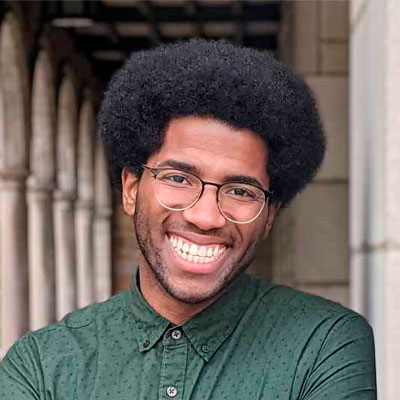If you’ve been following the ACLU of Pennsylvania’s work in recent years, you may have heard about our ongoing settlement with the city of Philadelphia regarding police officers’ use of stop-and-frisk. Recent rhetoric from Mayor Cherelle Parker and Philadelphia Police Department (PPD) leadership suggests that officers may increase their use of the controversial policing tactic.
Philadelphia skyline at sunset
In 2010, the ACLU of Pennsylvania and the civil rights law firm of Kairys, Rudovsky, Messing & Feinberg filed a federal class action lawsuit, Bailey, et al. v. City of Philadelphia, on behalf of Black and Latine Philadelphians. The lawsuit alleged that thousands of people each year are illegally stopped, detained, and frisked by the Philadelphia Police Department as part of its use of stop-and-frisk. The following year, the city and ACLU-PA reached a settlement agreement that included a provision that the city must monitor and store all information regarding use of stop-and-frisk. That data is also reviewed by ACLU-PA and our data experts so that we can make recommendations about how the city might more consistently adhere to constitutional mandates.
After nearly a decade and a half of monitoring Philadelphia Police Department’s stop-and-frisk data, a few trends have become clear.
First, the use of stop-and-frisk rarely achieves its primary stated purpose: police only recover deadly weapons in a tiny fraction of stops.
Second, even as the overall number of stops has dramatically declined over the years, the racial disparities have remained nearly the same. This means Black and Latine people are still much more likely to be stopped than their white counterparts.
There’s no question that stop-and-frisk fails to get dangerous weapons off the streets and has proven to be a racist policing tactic
Here’s the good news. In 2021, as a result of our settlement agreement with the city, the police department rolled out a pilot program in a limited number of police districts that would end the use of stop-and-frisk for minor offenses like littering, obstructing the sidewalk, or disorderly conduct. So long as the person committing the offense complied with officers and moved along, the interaction ended there.
This change reduced unnecessary police interactions with pedestrians without causing an increase in violent crime. It was such a success that the program went citywide in May of last year.
Despite the fact the city is obligated under the Bailey consent decree to preserve the changes made to how police use stop-and-frisk, in recent months we have seen a clear shift by city leadership towards more punitive and carceral “solutions” in the debate over public safety.
Mayor Parker’s recently released public safety plan focuses on failed policies reminiscent of the disastrous war on drugs: more arrests for drug possession and sex work, using incarceration in an unsafe jail where people can’t even get the most basic medical care as a means of “treatment” for substance use disorder, bussing unhoused individuals out of the city, and more.
Investing instead in the resources and programs that give Philadelphians the foothold and support that they need to realize their potential is the best way to secure a sustainable path towards improving public safety.
For example, instead of simply spending more money to arrest and incarcerate those dealing with substance use disorder, the city should invest more money in treatment. With only about 2,000 beds available citywide in rehab facilities and limited options for outpatient help, seeking treatment can range from daunting to downright impossible
The city could also do better to offer specialized treatment options to vulnerable populations like pregnant people and unhoused individuals – there is no one-size-fits-all solution to treating those struggling with substance use disorder.
We recognize that real solutions, those that invest in people and our communities and put Philadelphia on the path to truly improving public safety, can be a hard sell politically. These solutions can take some time to show results. They can be expensive – but so is continuing to pour over a billion dollars into our police and prisons each year.
We can’t arrest our way to public safety with the failed, racist tactics of the war on drugs. If Mayor Parker, City Council, and Police Commissioner Bethel want to truly improve public safety and not just score short-term political points, they need to invest in people, not prisons. They need to invest in treatment, not incarceration. They need to give Philadelphians the type of resources and programs that build up, not tear down our communities. It’s not an easy path. But it is the right one.
* Julie Zaebst, Senior Advocacy & Policy Strategist, Advocacy & Policy & Solomon Furious Worlds, Staff Attorney, Legal.

Julie Zaebst joined the ACLU of Pennsylvania in July 2014, bringing more than 10 years of experience as a program manager and advocate. Most recently, she directed the Policy Center at the Coalition Against Hunger, where she led the organization’s advocacy initiatives to protect and enhance the federal nutrition programs in Pennsylvania, including food stamps and school meals. Julie also served as interim executive director of the Coalition Against Hunger in 2013. A social worker by training, she previously worked in child welfare and as the associate director of the civic engagement Office at Bryn Mawr College. Julie earned her undergraduate and graduate degrees from Bryn Mawr. (Philadelphia)

Solomon Furious Worlds is a staff attorney with the ACLU of Pennsylvania, based in Philadelphia, and focuses on policing, search & seizure issues, protest rights, free speech rights, and obtaining government records. Before that, they represented immigrant children who came to America without an adult in Michigan. Throughout their career, Solomon has advocated/organized in support of LQBTQ+ rights, Black liberation, disability justice, Palestinian liberation, sexual assault survivors, and prison abolition. They graduated from the University of Michigan Law School with a J.D. and earned two bachelor’s degrees – in saxophone performance and social psychology – from the University of Iowa.







